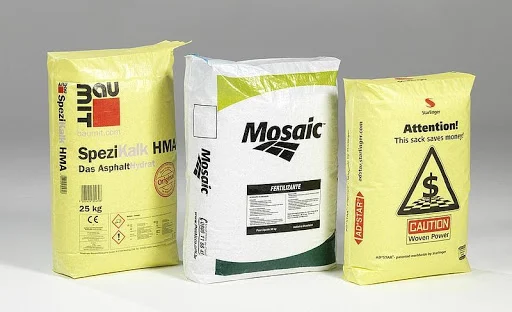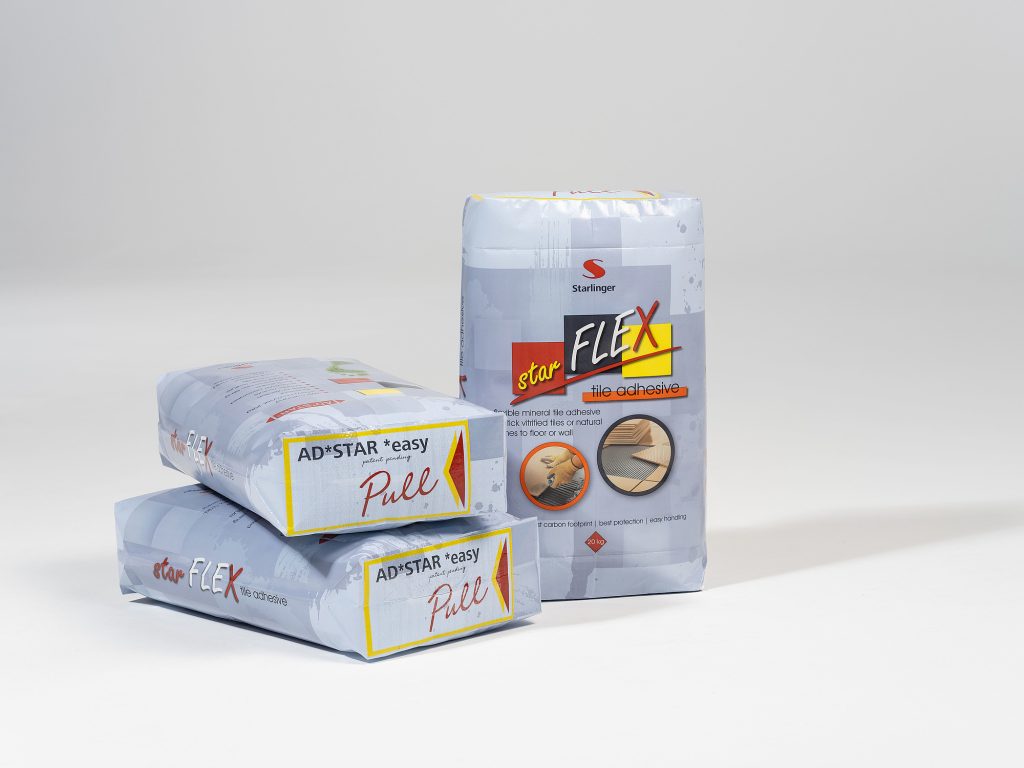Introduction
As industries across the globe place greater emphasis on eco-friendly practices and durable packaging solutions, AdStar bags have emerged as a compelling choice for manufacturers and distributors. These bags, known for their robust structure and sustainable features, offer a unique combination of environmental responsibility and mechanical performance. Whether used in the cement industry, agriculture, chemicals, or food packaging, AdStar bags deliver consistent results while minimizing ecological impact.
In this blog, we’ll explore how Ad*Star bags provide both sustainability and strength, and why they are becoming the preferred option for forward-thinking businesses.
What Are AdStar Bags?

Ad*Star bags are a patented type of block-bottom, valve or open-mouth sack made from woven polypropylene (PP) fabric. Unlike conventional multi-layer paper sacks, these bags are crafted using a single layer of coated polypropylene tape fabric and feature a strong, seamless, tubular construction. This results in exceptional durability, resistance to environmental factors, and cost efficiency.
Originally developed for cement packaging, Ad*Star bags have since expanded into various sectors due to their unique combination of strength and sustainability.
Sustainability Begins with Material Efficiency
One of the key factors contributing to the environmental appeal of Ad*Star bags is their efficient use of raw materials. Woven polypropylene fabric is lightweight yet incredibly strong, allowing manufacturers to use less material without compromising structural integrity. This results in lower energy consumption during production and reduced transportation costs, as more bags can be shipped in a single load due to their lower weight.
Moreover, the mono-material construction of Ad*Star bags (made entirely of polypropylene) enhances their recyclability, unlike multi-layer paper or composite bags, which can be difficult to separate and recycle.
Reusable and Recyclable: A Circular Packaging Solution
AdStar bags are purposefully designed with reusability in mind, making them an ideal choice for industries where packaging longevity and repeat use are both practical and desirable. Their rugged woven polypropylene construction offers outstanding structural integrity, allowing the bags to withstand multiple cycles of use without significant wear or loss of performance. This is particularly advantageous in agricultural, construction, and industrial sectors, where bulk goods are often transported or stored repeatedly. Unlike single-use packaging solutions, AdStar bags can be refilled, resealed, and redeployed several times, reducing the overall demand for new materials and lowering the total environmental footprint of packaging operations.
Beyond their extended usability, AdStar bags also offer a clear path toward sustainable disposal. Once these bags have reached the end of their functional life, they can be recycled through conventional polypropylene recycling systems. As a mono-material product, they do not require separation of layers or additional processing, which simplifies the recycling process and enhances efficiency. In regions with established recycling infrastructure, used AdStar bags are collected, cleaned, and processed into plastic pellets. These pellets can then be repurposed to manufacture a wide range of durable goods, including outdoor furniture, storage containers, construction materials, and even new packaging products. This closed-loop approach significantly reduces the volume of packaging waste that ends up in landfills and promotes a circular economy in which resources are continuously reused rather than discarded. Through both reuse and recyclability, Ad*Star bags exemplify how industrial packaging can align with environmental responsibility and long-term sustainability goals.
Durability Reduces Packaging Waste
A significant environmental advantage of Ad*Star bags lies in their exceptional mechanical strength, which directly contributes to sustainability throughout the packaging and distribution process. These bags are engineered to resist tearing, puncturing, and breaking—even under the rigorous demands of bulk handling, transportation, and storage. Their robust woven polypropylene construction ensures that the bags retain their shape and protective qualities, even when subjected to rough treatment or environmental challenges such as humidity and exposure to moisture. In contrast, traditional paper sacks are far more susceptible to damage under similar conditions, often leading to leaks, spills, or total failure.
The durability of AdStar bags translates into fewer damaged packages, which in turn means less product loss and reduced material waste. When packaging consistently protects its contents without frequent failure, it decreases the need for replacement bags, conserves resources, and minimizes the environmental burden associated with manufacturing and disposal. This reliability also enhances efficiency across the supply chain by preventing delays and reducing the cost of wasted goods. In a broader context, the extended life span and reusability of AdStar bags support long-term environmental goals by reducing the frequency of production and waste generation—two critical factors in building a sustainable packaging ecosystem.
Also Read: Choosing the Right Bag: When to Use AdStar Over Woven or Paper Bags
Moisture and UV Resistance
Ad*Star bags are inherently moisture-resistant due to the coated polypropylene fabric, making them ideal for products that must remain dry, such as cement, fertilizers, sugar, salt, and grains. The ability to resist moisture prevents spoilage and waste, especially in humid or wet conditions.
In addition, these bags can be made with UV stabilizers to endure prolonged exposure to sunlight without degradation. This is particularly beneficial in industries where goods may be stored outdoors. UV resistance helps extend the bag’s lifespan and ensures consistent protection for the product inside.
Efficient Manufacturing Process
The manufacturing process of Ad*Star bags also supports environmental objectives. Using a hot air welding system, rather than adhesives or stitching, allows for seamless construction and minimizes material waste. This process is not only energy-efficient but also enhances the strength and barrier properties of the bag, further reducing the likelihood of failure during handling or transportation.
Additionally, fewer manufacturing steps mean less carbon output per unit, making Ad*Star bags a smarter choice for companies looking to minimize their environmental footprint.
Supporting Sustainable Supply Chains
Companies that invest in Ad*Star bags are also investing in sustainable supply chain practices. By choosing packaging that is durable, reusable, and recyclable, businesses align themselves with eco-conscious consumers and regulatory trends that favor environmental responsibility.
In sectors like agriculture, construction, and retail, reducing packaging waste and improving transport efficiency can significantly lower overall carbon emissions. Ad*Star bags contribute to these goals by:
- Lowering the need for secondary packaging
- Reducing returns due to damaged goods
- Enhancing stackability for better logistics
- Minimizing environmental impact through recyclability
Ad*Star vs. Traditional Alternatives
When it comes to strength and environmental performance, AdStar bags hold a clear advantage over traditional packaging options such as paper bags and laminated woven bags. Their durability is significantly higher, ensuring better protection of goods during transport and storage. Unlike paper bags, which are single-use and prone to tearing, AdStar bags are reusable and maintain their structure even after multiple uses. Their mono-material construction—made entirely from polypropylene—makes them easy to recycle, whereas paper bags with multiple layers or laminated woven bags can pose challenges in recycling due to material complexity. Additionally, AdStar bags offer excellent resistance to moisture, unlike paper alternatives that degrade quickly when wet. They can also be manufactured with optional UV protection, adding another layer of durability for outdoor storage. From a production standpoint, AdStar bags generate minimal waste, further contributing to their environmental appeal. This combination of resilience and sustainability makes Ad*Star bags a long-term, eco-conscious solution for businesses aiming to reduce their environmental footprint without compromising on performance.
Customization and Branding with Eco-Conscious Design
Another benefit of Ad*Star bags is their customizability, which includes the option to print logos, product information, and handling instructions directly onto the surface using flexographic or rotogravure techniques. This eliminates the need for extra labels or packaging, further reducing material use.
Moreover, brands that prioritize sustainability can communicate their values directly on the packaging—appealing to today’s environmentally aware consumers. Eco-friendly branding is no longer just a marketing strategy; it’s a reflection of corporate responsibility.
Conclusion
In a world increasingly focused on sustainable practices, Ad*Star bags offer an ideal combination of strength, efficiency, and environmental responsibility. From reducing material usage and transportation emissions to being recyclable and reusable, these bags address many of the challenges businesses face in adopting greener packaging solutions.
Whether you operate in agriculture, construction, chemicals, or retail, transitioning to Ad*Star bags not only enhances product protection and supply chain performance—it also contributes to a more sustainable future.
